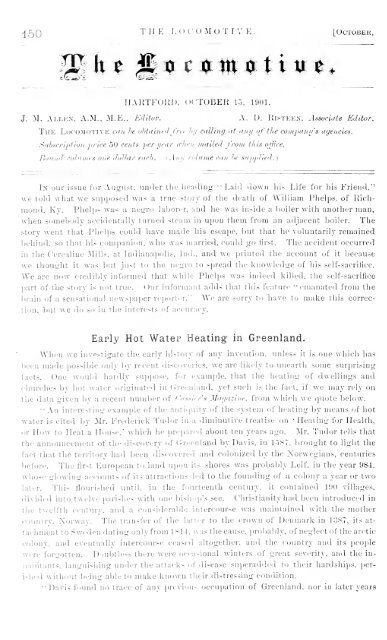The Locomotive - Lighthouse Survival Blog
The Locomotive - Lighthouse Survival Blog
The Locomotive - Lighthouse Survival Blog
Create successful ePaper yourself
Turn your PDF publications into a flip-book with our unique Google optimized e-Paper software.
^50 THE L C OMOTIVE. |October,<br />
HARTFORD, OCTOBER 15, 1901.<br />
J. M. Allen, A.M., M.E.. Editor. A. D. Risteen, Associate Editor.<br />
<strong>The</strong> <strong>Locomotive</strong> can be obtained free by calling at any of the company's agencies.<br />
Subscript ion price 50 cents per year when mailed from this office.<br />
Bound volumes one dollar each. (Any volume can lie supplied. |<br />
In our issue for August, under the heading "Laid down his Life for his Friend,"<br />
we told what we supposed was a true story of the death of "William Phelps, of Richmond,<br />
Ky. Phelps was a negro laborer, and he was inside a boiler with another man,<br />
when somebody accidentally turned steam in upon them from an adjacent boiler. <strong>The</strong><br />
story went that Phelps could have made his escape, but that he voluntarily remained<br />
behind, so that his companion, who was married, could go first. <strong>The</strong> accident occurred<br />
in the Cerealiue Mills, at Indianapolis, Ind.. and we printed the account of it because<br />
we thought it was but just to the negro to spread the knowledge of his self-sacrifice.<br />
We are now credibly informed that while Phelps was indeed killed, the self-sacrifice<br />
part of the story is not true. Our informant adds that this feature " emanated from the<br />
brain of a sensational newspaper reporter." "We are sorry to have to make this correc-<br />
tion, but we do so in the interests of accuracy.<br />
Early Hot Water Heating- in Greenland.<br />
When we investigate the early history of any invention, unless it is one which has<br />
been made possible only by recent discoveries, we are likely to unearth some surprising<br />
facts. One would hardly suppose, for example, that the heating of dwellings and<br />
churches by hot water originated in Greenland, yet such is the fact, if we may rely on<br />
the data given by a recent number of Cassier ,<br />
8 Magazine, from which we quote below.<br />
•An interesting example of the antiquity of the system of heating by means of hot<br />
water is cited by Mr. Frederick Tudor in a diminutive treatise on 'Heating for Health,<br />
or How to Heat a House." which he prepared about ten years ago. Mr. Tudor tells that<br />
the announcement of the discovery of Greenland by Davis, in 1587. brought to light the<br />
fact that the territory had been discovered and colonized by the Norwegians, centuries<br />
before. <strong>The</strong> first European to land upon its shores was probably Leif, in the year 984,<br />
whose glowing accounts of its attractions led to the founding of a colony a year or two<br />
later. This flourished until, in the fourteenth century, it contained 190 villages,<br />
divided into twelve parishes with one bishop's see. Christianity had been introduced in<br />
the twelfth century, and a considerable intercourse was maintained with the mother<br />
country, Norway. <strong>The</strong> transfer of the latter to the crown of Denmark in 1387, its at-<br />
tachment to Sweden dating only from 1814. was the cause, probably, of neglect of the arctic<br />
colony, and eventually intercourse ceased altogether, and the country and its people<br />
were forgotten. Doubtless there were occasional winters of great severity, and the in-<br />
habitants, languishing under the attacks of disease superadded to their hardships, per-<br />
ished without being able to make known their distressing condition.<br />
"Davis found no trace of any previous occupation of Greenland, nor in later years
















